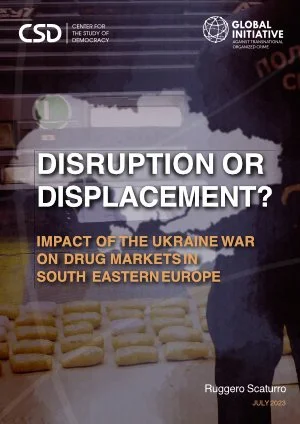Disruption or Displacement? Impact of the Ukraine War on drug Markets in South Eastern Europe
By Ruggero Scaturro
Recent studies conducted by the Global Initiative Against Transnational Organized Crime (GI-TOC) and the United Nations Office on Drugs and Crime (UNODC) show that the war in Ukraine may displace existing drug trafficking routes from and through Ukraine and exacerbate the instability that enables drug trafficking and manufacturing, including in areas not directly connected or exposed to hostilities.
Trauma derived from the conflict might also have an impact on current and future drug use patterns in communities affected by the war, which could create new opportunities for both local and foreign drug traffickers to meet this growing demand. This becomes particularly relevant when analyzing flows of traditional opioids as well as new psychoactive substances (NPS), and stimulants used by both civilians and soldiers at the front line. Neighbouring Ukraine, the South Eastern Europe region represents a relatively small market for drug consumption and accounts for only a small amount of drug production and supply (primarily cannabis) to EU markets. However, its strategic location between East and West – and its proximity to the Ukraine conflict – might mean that it is particularly exposed to the effects of the war on traffickers’ modus operandi and trafficking routes through the region.
Since February 2022, the Russian invasion of Ukraine has caused the progressive displacement and movement of traditional drug production and trafficking hubs in southern and eastern Ukraine towards the west, around the borders with Poland, Slovakia and Romania. Similarly, in the context of criminal mobility, overwhelmed border security management between Ukraine and its neighbouring countries to the west leads to opportunities for both Ukrainian and Russian criminals to operate and manage their businesses from South Eastern Europe, thanks to the possibility to forge documents and receive ‘golden’ passports due to their investments in countries in the region.
This report assesses whether the war in Ukraine and its resulting disruption are having a significant impact on drug flows through South Eastern Europe. The research is based on the assumption that, because of an intensified military presence in Eastern Europe, traditional flows of drugs have been, at least temporarily, disrupted. This includes the northern route of opioids from Afghanistan, which supplies large markets across Central Asia, Russia, Ukraine and Belarus. Furthermore, other drug routes, such as for cocaine from Latin America to the port of Odesa, have atrophied. Conversely, flows along alternative routes, such as the Balkan route, appear to have intensified.
In view of these shifts, this report offers an assessment of emerging trends in drugs flows and provides an overview of data on seizures in South Eastern Europe. It also assesses the impact that the Ukraine war is having on wholesale and retail drug prices and, where assessment is possible, on levels of purity and the perceived quality of substances.
Center for the Study of Democracy; Global Initiative Against Organized Crime, 2023. 28p.


